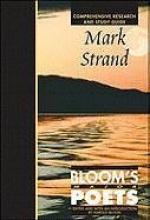|
This section contains 7,244 words (approx. 25 pages at 300 words per page) |

|
SOURCE: Gregerson, Linda. “Negative Capability.” Parnassus: Poetry in Review 9, no. 2 (fall/winter 1981): 90-114.
In the following essay, Gregerson contends that in Strand's later work the focus of his poetry shifts from renunciation to restoration.
“… it seems to me that we should rather be the flower than the bee. …”
John Keats to J. H. Reynolds, February 19, 1818
When Mark Strand reinvented the poem, he began by leaving out the world. The self he invented to star in the poems went on with the work of divestment: it jettisoned place, it jettisoned fellows, it jettisoned all distinguishing physical marks, save beauty alone. It was never impeded by personality. Nor was this radical renunciation to be confused with modesty, or asceticism. The self had designs on a readership, and a consummate gift for the musical phrase:
I give up my eyes which are glass eggs. I give up my tongue. I give...
|
This section contains 7,244 words (approx. 25 pages at 300 words per page) |

|


